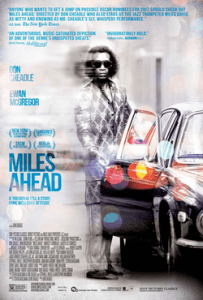Review of Miles Ahead, Directed by Don Cheadle
Miles Ahead is a biopic predicated on an important assumption: it assumes that the audience already likes Miles Davis (Don Cheadle) and has a profound respect and admiration for him as an artist. Set during his fabled five-year absence from the music scene (and from public life, for that matter), the film, written and directed by Cheadle, offers a window into Miles Davis the man. Through this window we see Miles in a two-day encounter with the tenacious and highly unethical Rolling Stone journalist Dave Brill (Ewan McGregor) who wants to help him by telling the world his story of isolation and artistic frustration.
The result is a drug- and alcohol-ridden buddy comedy, complete with a car chase, a record label hit man, and lines of cocaine. Combined with a peppering of flashbacks showing the unraveling of Miles’ personal and artistic life, it paints a picture of a descent into despair.
Miles Davis was a great artist, with style to boot. It is apparent from the opening interview – presumably conducted after all the events of the film – that he has his own unique experience of the creative process and understands the essence of jazz. “Don’t call it jazz, don’t call it jazz.” he insists at one point, “Call it social music.”
Miles’ artistry is reflected in the film’s style and technique. It flows like a jazz song. The visuals merge and trail in and out of each other – from the present to the past and back again. A song, a place, a drink, or a gunshot might give way to a memory of Miles as he wooed, wedded, and decimated his first wife, Frances Taylor (Emayatzy Corinealdi). His past builds on itself from the present, gradually revealing to the audience how Miles got to his present state of isolation. This gives the film continuity and a coherent story even as it feels improvisational.

So it’s like jazz in cinematic form, but it also evokes a bad drug trip. Suffice it to say that a line of cocaine is scored at one point, which Miles pays for with an autograph. The moment is one of many in the film that illustrates the high cost of artistry coupled with fame. Art of the sort Miles created, the kind that reshapes boundaries and drives the evolution of genres, takes an absurd level of self confidence and an absurd disdain for the seething mass of idiocy that is humanity. It is costly for artists to refuse to conform to expectations, the film shows us, because sometimes those expectations push back, especially when they have the weight of a legal contract behind them.
Miles Ahead is also a sad reminder that genius in an individual has almost no direct correlation to the things that really matter: things like character, love, sacrifice. Pardon my crass terminology, but Miles is a Class A dick. He flatly refuses to abide by the contract with his record label, and threatens the executive with a gun when the studio comes to collect its due. He forces his way into a boxing fight by offering his face as the ticket: “you’re look at it.” At one point he finishes talking on the phone with Frances, his wife-to-be at the time, and abruptly goes to bed with two other women without a trace of guilt.
It’s no surprise Miles ends up alone. After this portrait – this “episode in the life of,” if you will – I would never wish celebrity on anyone.











